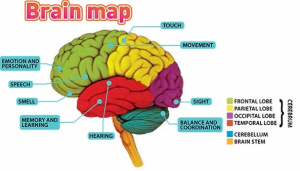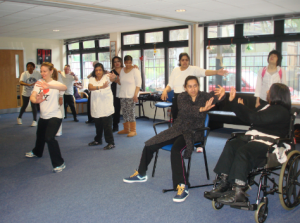Our amazing brains are most challenging in time when we’re born right through to either leaving school or university. And from then on we tend to think, that’s it, I’m now invincible and a know it all, to some degree.

We then may get a job and then there is a new challenge and we keep at it until we get to that comfortable zone yet again.
What is not surprising is that we can fall into the trap of getting comfortable with our lives and carry it through thinking we’re good at what we do.
But, are we really good at what we do or, are we just saying it because this is how we want to feel about ourselves?
Whether we’re 88, 18 or 8, having energy and enthusiasm in what we need to keep doing what is right for us from the very start.
It is our life and we should atleast give it our all in everything that we do to achieve a positive outcome to keep our brains healthy.
For example, some of us may procrastinate about physical exercises, I know I do, my children are always telling me that I need to exercise more, go to a gym, walk more often etc etc.
So what is it about us that we make excuses on certain things, yet, we can spend copious amount of time that has nothing to do with challenging our brains or remotely rewarding.
Our amazing brains are complex yet it holds all that helps us function in our daily living and it is probably the least that we may not be exercising.
So What can we do?
Going out with friends, garden chores, paying the bills, following the news and constantly reading and asking questions helps.
So, to be a curious person may allow a person to feel part of life and ones community.
Another example is; if a bill can be paid at the post office then getting off the computer & make the trip is certainly good for you.
At a certain age we begin to think that we know everything and it is wise to remember that life is a learning experience.
Even experts say that to help keep our thinking skills sharpened is to learn new skills.
Protection
Cognitive and social engagement have been shown to be protective against cognitive decline, whereas hearing loss, depression, and social isolation are associated with cognitive decline says Dr. Kathryn Papp, neuro psychologist and instructor in neurology at Harvard Medical School.
No one can really pin point the exact reasons why mental and social engagement protect our thinking skills, however, what we now know is that we can grow new cells.
Being socially engaged may help fend off social isolation and depression, both of which have been linked with a decline in cognitive functioning later in life.
Having good social support also reduces stress, another thing that we know has a negative impact on thinking skills.

Other factors
A healthy lifestyle is also associated with neurogenesis, especially getting enough sleep, avoiding overeating, and the grand ole avoidance of a lot of us: exercising.
Researchers have found that physical exercise leads to the release of cellular growth factors that are important for neurogenesis.
And we can grow new brain cells that comes from healthy living, challenging our amazing brains, and staying socially connected in a meaningful way.
These little disciplines help protect the brain or keep it more resilient against changes that cause dementia.
Where To Get Started
What’s the easiest way to rev up your thinking skills? Start with mini-challenges for our amazing brain such as;
Brush your teeth with the hand you don’t usually use. Take a different route to work or the store. Eat a bite or two of dinner with your eyes closed.
Listen to a new kind of music, be patient with it to try and understand it.
Do 60 seconds of jumping jacks or any physical activity that is within your capability.
Sit in a different spot in your house or at a favorite restaurant.
While the above may sound silly, they require the brain to do some work, because it’s encountering something different.
You can also look for activities that incorporate brain stimulation, physical activity, and social engagement, such as:
– learning to play a sport or game (tennis, ping pong, golf)
– learning to dance (try the cha-cha, the rumba, or the merengue)
– taking a class on planting flowers or vegetables, create raised garden beds.
– learning Tai Chi, which has been shown to boost thinking skills.
If physical activity isn’t possible, consider taking a class in painting but, trust me on this, start with watercolors because painting isn’t easy for everyone!
Try Writing a short story.
A new language.


Or you can simply take part in any new activity that you find interesting, such as:
– volunteering at a local charity
– exploring a new city or join a book club
– trying out a new restaurant or new type of food or helping out at a local school or day care
The best activities will be the ones that you find enjoyable and just like it’s important to stick to a medication, you’ll have to stick to a pattern of always learning.
You can however, work on the atrophy of neurogenesis and have a high impact on it by performing new things.
This could be as simple as going to work along a different path, or having a different drink at the bar, or changing your weekend
However, we can do the best impact on our amazing brains by learning new things. If you don’t know what to learn,
I’ve detailed a list of challenging tasks that you can learn and maintain your amazing brain.
Activities That Challenge Your Brain
Our amazing brains generate new neurons and new connections each time we challenge it and, in turn, it can decrease as we get old.
This affects our life by making us more difficult to learn new things.
Neurogenesis decreases with age has two sides:
The first being due to several physiological issues with age.
Second, is not making full use of our amazing brains so it begins to deteriorate which can possibly lead to Dementia.
We can do little to avoid the first reason, however, you should have a healthy life generally speaking. Doing sport and eating properly can minimize the effect of genes in neurogenesis.
However, the effect on that is very small.
You can however, work on the atrophy of neurogenesis and have a high impact on it by have a go at new things. This could be as simple as going to work along a different path, or having a different drink at the bar, or changing your weekend
However, you can do the best impact in your neurogenesis by learning new things.
If you don’t know what to learn, below, you will find a list of challenging tasks that you can learn and maintain your neurogenesis alive.
Look through the list, and choose something that may suit you.
Your brain will tell you when you’ve reached saturation and that is when it is time to pick another subject or activity.
Learn New Languages.
Learn to play an instrument.
How to take award winning pictures with a digital camera.
How to paint.

Learn to play chess
Learn to play Backgammon
How about Scrabble Learn Yoga or complete a free MOOC online course.
Once you have a good and well knowledge of one challenge, you will have a very powerful brain box.
Other new experiences can also be had as a mentor to someone, which is very rewarding in itself.
Our amazing brains is the one thing that can keep us happy so what do you reckon, is it worth investing in?
Increase your brain activity right now with small challenges and watch your endorphins pop!
You may also want to read about how Laughter can reduce many ailments from your life and, below is a short 1.5 minute silent video to watch.
Show your loved one that you care with a mini pico Finder. GPS Tracker




